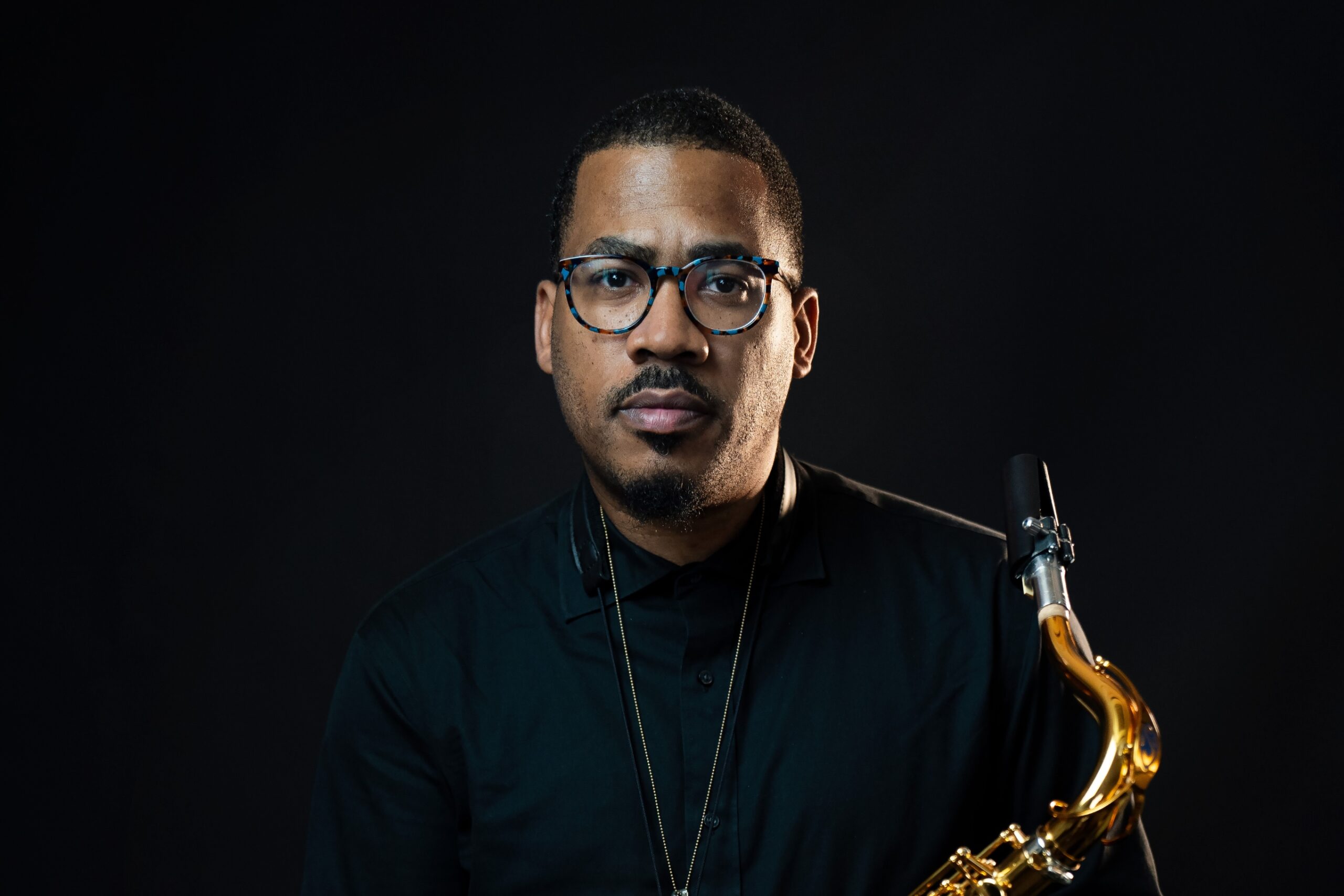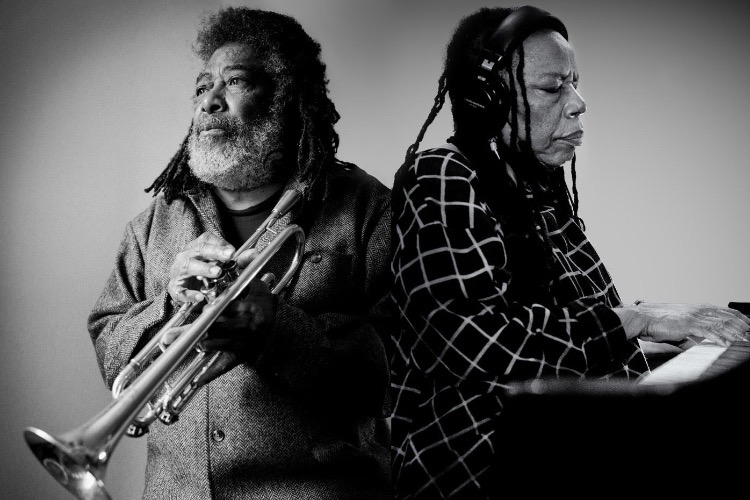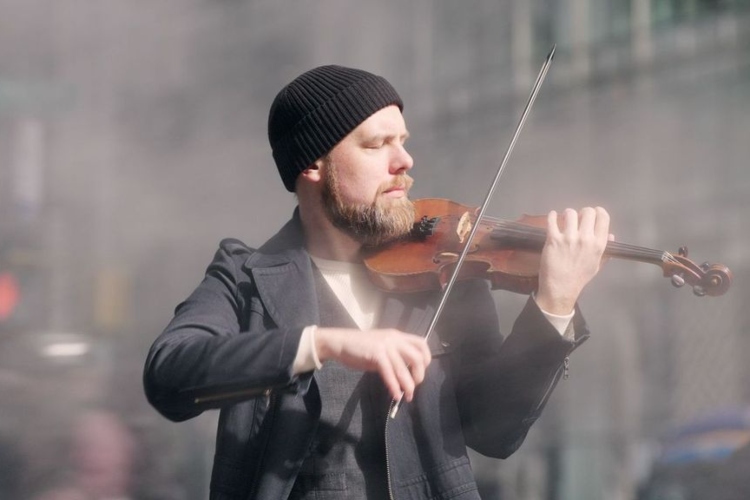Even the Sparrow: James Brandon Lewis Previews his 2023 Newport Jazz Festival Performance
|
Getting your Trinity Audio player ready...
|
Ingrained in jazz, hip hop, punk, gospel, and R&B, tenor saxophonist James Brandon Lewis has discovered a unique way to give equal footing to concepts many would categorically divide. His broad perspective is largely based on his concept of molecular systematic music (MSM). The current subject of Lewis’ doctoral studies, MSM recontextualizes artistic influences through the lens of molecular biology, specifically DNA.
Practical application of these theories is most evident in the three recordings by Lewis’ Molecular Quartet but seemingly shapes all of his output. Jesup Wagon (Tao Forms, 2021) is an invigorating work that takes cues from social, musical, and cultural history to honor George Washington Carver. The release met much acclaim, including the title Album of the Year by not only this publication but also by Downbeat, and the Annual Francis Jazz Critics’ Poll. The Red Lily Quintet, the ensemble featured on Jesup, will release a breathtaking follow-up dedicated to the life and work of gospel great Mahalia Jackson, For Mahalia, with Love (Tao Forms, 2023), in August. We will feature an interview with Lewis on this work in a few weeks. At this summer’s Newport Jazz Festival, Lewis will present a version of his razor-edged power trio, which combines free jazz’s yearning for freedom with the aggressive outrage of punk.
Over the last sixty-nine years, the Newport Jazz Festival has hosted some of improvised music’s greatest saxophonists; John Coltrane, Archie Shepp, Sonny Rollins, and Albert Ayler, to name a few. Even the famous 1956 Duke Ellington performance that saved the bandleader’s career is partly a story about the prowess of his tenor saxophonist, Paul Gonsalves.
But history can be a double-edged sword. For some, the past may serve as a straightjacket, restraining them to emulation of their creative ancestors. For master artists, however, those who came before merely opened doors of opportunity while providing room for a divergent path. The power of his music and the depth of our conversation confirm that Lewis is the latter.
PostGenre: This summer will be your first time at the Newport Jazz Festival, right?
James Brandon Lewis: Yes, that’s correct.
PG: How did you learn the Festival wanted you to perform there?
JBL: Basically, I was working through a booking company, and they reached out to my manager. An inquiry was made, and I was excited. The history of the Newport Jazz Festival precedes itself. It also precedes me; people made history there long before I was even on this planet. I’m honored to be performing there and I’m really looking forward to it.
PG: So, Newport is not just another gig?
JBL: No, definitely not. I mean, it’s Newport. No way this is just another gig. I can’t stress how excited I am to perform at Newport.
PG: You will perform with a version of your trio from Eye of I (Anti-, 2023). A theme of Eye of I is the importance of focusing on your authentic self and not trying to copy what came before. Do you feel it is more difficult to avoid emulation at a place like Newport where the greats cast such huge shadows, compared to somewhere without that history?
JBL: No. I think the biggest thing for me is that I need to be okay with what I see in the mirror every day. I owe it to myself to be as real and authentic as possible. I need to be honest with myself. I think that being vulnerable to the moment, in general, is what we artists sign up for when we agree to play music. It’s all answers. It’s all perspectives. And as long as you’re okay with that, you’ll be fine. I try to do the best that I can to be myself. And those greats that we all love and admire, that is what they did. They were exactly themselves and no one else when they played Newport, or anywhere else.
I just try to honor where I’m from. Honor what my parents and grandparents instilled in me. And just try to be truthful. All of that is what I try to do musically the best I can. We all come from somewhere. But I think there’s a huge process of learning how to be yourself. To do that, you must strip away, as best you can, many of your influences so you can better get to yourself. I’ve gone through different phases, like all people who go to college for music, of transcribing and learning to get into “vocabulary” only to eventually decide on what happens naturally.
It’s no different than when you start to become an adult and move away from your parents. To some extent, you kind of strip away some of their teachings. Hopefully, you still hold onto enough of the good stuff that they taught. But you ultimately realize you have your own identity. Your own vibration. Your own feel. I just try to navigate by just being myself and honoring myself.
PG: At Newport, you will lead a trio. You have several great trio recordings as a leader, including the recent Eye of I. Is there something specific that attracts you to the trio format?
JBL: With such a small group, there is no hiding. I used to think, especially when I was younger, that sometimes you could hide musically. Now that I’m older, I don’t think that’s possible. I think you expose exactly who you are musically, and the trio is a good format for showing who you are.
With the trio concept itself, we’re basically chasing energy. We bring the energy of rock, hip-hop, and funk influences. That thought applies to the trio album [Divine Travel (Masterworks/Okeh, 2014) that I did with William Parker and Gerald Cleaver, to Days of Freeman (Masterworks/Okeh, 2015) with Jamaladeen [Tacuma] and Rudy [Royston], and to Eye of I. At this point, I think people kind of know what the trio music sounds like in a general sense, removed from its specific personnel.
PG: For the Newport performance, are you planning to play primarily pieces from Eye of I?
JBL: Yeah, mainly pieces from the album. I might throw in a few surprises. Some things that are probably less expected. But mostly the vibe of the album.
PG: One interesting thing about the trio on Eye of I is that you did not use a more traditional sax-bass-drum instrumentation. Instead, you swapped out the bass for Christopher Hoffman on the cello. What inspired you to have a cello in the group?
JBL: Over the years, I have played with Chris and have been fascinated by him. I’ve been fascinated by the instrument itself. I also felt like it was great to switch things up, though I don’t know if the music itself was orchestrated, necessarily, for a cellist. It was a pleasure to work with Chris. He is a phenomenal player. You have to be if you are working with Henry Threadgill. It was great working with him. Same with [album drummer] Max Jaffee. I met him when he played Vision Festival one year with a vocalist. He too is a great player.
PG: Though the music at Newport will be mostly pieces from Eye of I, there are some personnel changes from the album.
JBL: My trio in general is often multiple different iterations of people. At Newport, I’m playing with an electric bassist [Josh Werner] and [drummer] Chad [Taylor]. The trio personnel are constantly in flux.
PG: How do you think the change from cello to electric bass, specifically, changes the trio’s sound, if at all?
JBL: Everyone has their own personality that comes out in the music. But I think the music still mostly sounds the same. As I said, I don’t necessarily know if I did my due diligence and wrote specifically for cello for the album. Because Chris used pedals on his cello, he sounds almost more like a bass on some of the tracks anyway. I don’t think the sound of the trio will be affected that much other than Josh bringing who he is, his personality, musical personality to the table.
PG: One additional aspect of Eye of I is how it includes your composition, “Even the Sparrow.” Your forthcoming Mahalia Jackson tribute album, For Mahalia with Love (AUM Fidelity, 2023), begins with a version of that piece combined with “His Eye is on the Sparrow.” Did you intend to bridge the two projects by using “Even the Sparrow” on both?
JBL: Well, I’ve been playing “Even the Sparrow” for a while now. There’s even a video recording from a few years ago of me playing it with Bill Frisell, Gerald Cleaver, and Kirk Knuffke. I just like playing the tune.
But originally, when I was studying with Charlie Haden at CalArts, he would play some of his music for us. There’s a song he wrote, I believe, for his wife, called “First Song.” You can find it on so many different albums of his. I was inspired by how he used it for different projects and intrigued by the idea of how many times I could play “Even the Sparrow” in different ensemble configurations. For my Mahalia Jackson album, I felt it was perfect to begin with “His Eye is on the Sparrow,” a song so strongly associated with her, and respond to it with “Even the Sparrow.”
PG: In a way, bridging the gap between the past and present.
JBL: I think it worked out pretty well. Even better than I thought it would be.
Catch James Brandon Lewis with his trio, featuring bassist Josh Werner and drummer Chad Taylor, on Saturday, August 5, 2023, at the Newport Jazz Festival. The trio will perform at 12:10 PM on the Harbor Stage. More information on the Festival can be found here. We will be providing live coverage of the event.
‘Eye of I’ is now available on Anti- Records. It can be purchased on Bandcamp. You can learn more about Lewis on his website.
Stay tuned to our site as we catch back up with Lewis to discuss his gorgeous Mahalia Jackson tribute album, For Mahalia with Love.



